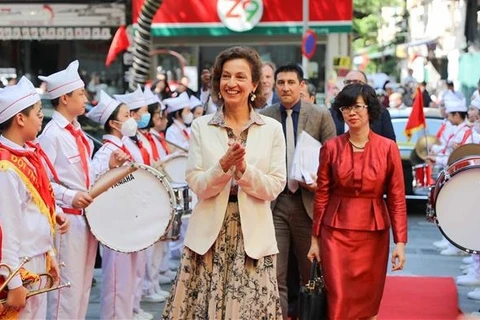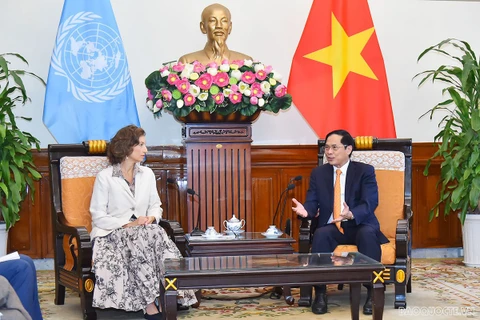Hanoi (VNA) - A UNESCO workshop was held in celebration of Vietnam signing on to the 1972 Convention Concerning the Protection of the World Cultural and Natural Heritage. The event represents efforts to help improve public awareness, and elevate the conservation and maintenance of cultural and natural relics.
The workshop was held on September 6 in Ninh Binh province under the theme of “World relics for self-reliance and sustainable development” to mark the 50th anniversary of the Convention Concerning the Protection of the World Cultural and Natural Heritage.
The ceremony and the presence of UNESCO Director General Audrey Azoulay manifests Vietnam’s role in the international community to honour and promote cultural relics of the past. At the same time, the event helps popularise Vietnam’s achievements in the conservation and promotion of the world relics.
This chance also affirms Vietnam’s position in the framework of UNESCO mechanism and realises the Vietnam-UNESCO MoU on cooperation for the 2021-2025 period, and is hoped to facilitate Vietnam’s election to the World Heritage Committee for the 2023-2027 tenure.
Deputy Foreign Minister Ha Kim Ngoc, who is also Chairman of the Vietnam National UNESCO Committee, highlighted that the 1972 Convention is the first and the only international agreement that associates the conception of natural protection with the cultural heritage conservation. It brings about a new approach with necessary legal bases that ensures a balanced and harmonious relationship between humans and the nature.
Over the past 50 years, the convention has been developing, perfecting and proving itself as an agreement that influences the conservation of cultural and natural heritages of global values, in line with the spirit of UNESCO.
According to Deputy Minister Ngoc, playing its role as “wisdom organisation” and “lab of ideas”, UNESCO has supported and facilitated Vietnam in not only knowledge and financial resources for its national development and construction, but also in making important contributions to the building of national strategies to realise the goal of sustainable development.
The official visit to Vietnam by the Director General with various significant activities continues to affirm the value and importance of the effective and practical relations between Vietnam and UNESCO, Ngoc said.
 UNESCO Director General Audrey Azoulay (R) receives Prime Minister Pham Minh Chinh in his visit to UNESCO headquarters in Paris in November 2021. (Photo: VNA)
UNESCO Director General Audrey Azoulay (R) receives Prime Minister Pham Minh Chinh in his visit to UNESCO headquarters in Paris in November 2021. (Photo: VNA) About the selection of Ninh Binh to host the event, Ngoc said the province’s Trang An Complex is an invaluable heritage of Vietnam that helps diversify and enrich the world’s map of cultural and natural heritages.
The socio-economic changes in Ninh Binh province serve as clear evidence of the success in combining the conservation and promotion of the heritage with the development of tourism and the improvement of locals’ livelihood, the official said.
Over the past 35 years as part of the 1972 Convention, the Vietnam National UNESCO Committee has been working as a regular and most rapid channel that brings about raising capacity and expertise in the heritage conservation work. It also serves to elevate international cooperation and education concerning the work.
Minister of Culture, Sports and Tourism Nguyen Van Hung said the world heritages in Vietnam have made effective and active contributions to the country’s sustainable socio-economic development. They create jobs at localities and in communities, help develop tourism, trade and investment, and popularise Vietnam’s national image, culture, history and traditions to foreign friends.
At the 17th session held in Paris on November 16, 1972, UNESCO passed a convention concerning the protection of the world cultural and natural heritage.
By 2020, up to 194 countries had ratified the convention and become its members. Vietnam made it on October 19, 1987, and has by now had eight world heritages recognised by UNESCO./.

























